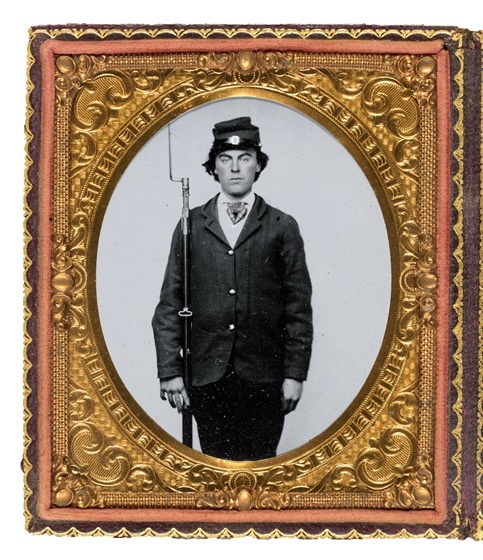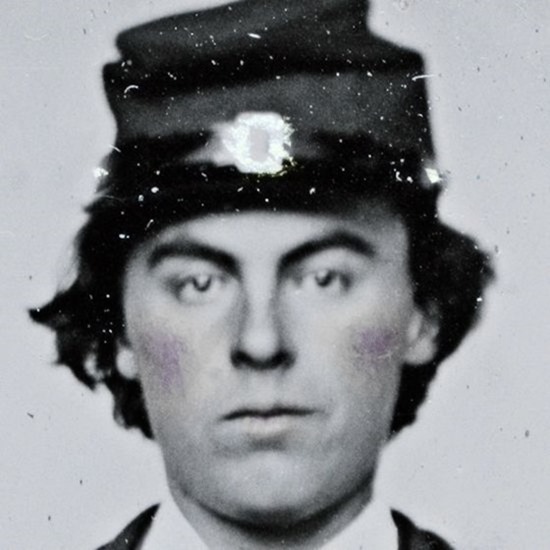December 31.—Our brother John was married in Boston to-day to Laura Arnold, a lovely girl.
December 2013
December 31, Thursday. The year closes more satisfactorily than it commenced. The wretched faction in the Free States which makes country secondary to party had then an apparent ascendency. They were dissatisfied with the way in which the War was conducted, — with what they called the imbecility of the Administration, — and, uniting with another faction which is opposed to the War, they swept the States. The country understands them better than it did. The War has been waged with success, although there have been in some instances errors and misfortunes. But the heart of the nation is sounder and its hopes brighter. The national faith was always strong, and grows firmer. The Rebels show discontent, distrust, and feebleness. They evidently begin to despair, and the loud declarations that they do not and will not yield confirm it.
The President has well maintained his position, and under trying circumstances acquitted himself in a manner that will be better appreciated in the future than now. It is not strange that he is sometimes deceived and fails to discriminate rightly between true and false friends, and has, though rarely, been the victim of the prejudices and duplicity of others.
The Cabinet, if a little discordant in some of its elements, has been united as regards him. Chase has doubtless some aspirations for the place of Chief Executive, which are conflicting. Seward has, I think, surrendered any expectation for the present, and shows wisdom in giving the President a fair support. Blair and Bates are earnest friends of the President, and so, I think, is Usher. Stanton is insincere, but will, I have no doubt, act with Seward under present circumstances.
December 31.—One of the stormiest and bleakest nights I have ever witnessed. I looked out and the darkness was fearful. The sky appeared as if God had shut out the light of his countenance from us forever. The elements are warring like our poor selves.
I never look on such a night without thinking of the soldier who may be at that moment doing sentinel duty. How dreary must be his walk as he paces along,
“And thinks of the two on the low trundle-bed,
Far away in the cot on the mountain;
His musket falls slack, his face, dark and grim,
Grows gentle with memories tender,
As he mutters a prayer for the children asleep,
And their mother, may Heaven defend her.”
Another sun has run its yearly course, and to all appearances we are no nearer the goal of liberty than we were this day last year. No gleam of light comes to tell us that reason has returned to the darkened minds of our ruthless foe. We have to listen to tales of wrong committed on our people, enough to rouse the blood in the coldest heart, and make us in despair cry aloud for vengeance.
“The blood of murdered legions
Summons vengeance from the skies;
Flaming towns and ravaged regions,
All in awful judgment rise.”
In the past year we have suffered disaster after disaster, but nothing is worth having which does not cost a struggle; and, then, as our beloved president tells us, it is only for a little while. The enemy has brought army after army against Richmond, and have as often had to retire in dismay and confusion before the invincible Lee and his veteran army.
The enemy have the Mississippi River only in name. Louisiana is almost as free from them as it has been since the fall of New Orleans. Texas is ours. Mississippi is guarded by that king of cavalrymen, Forrest. Charleston,
“Through coming years its name
A talisman shall be.”
Shell after shell has been hurled against its sacred walls. Column after column of the invader round it have found graves.
Ah I would I could say as much about Tennessee. How my heart sickens at the desecration of her sacred vales and mountains! Our dead are not permitted to lie in their resting-places; houses are fired, and their inmates cast out into the ruthless storm.
“The wing of war that, hovering
O’er this bright and beauteous land,
Throws a dark, foreboding shadow
Round our faithful, fearless land.
But we will ne’er grow discouraged,
Though the vandals round us crowd;
For our star is not declining,
‘T is only vailed behind a cloud.
Hark! the bugle note is sounding,
The fearful crisis comes at last;
By Heaven’s help we’ll scatter them
Like autumn leaves before the blast;
Then from peaceful dell and mountain
Will ring the anthems of the free,
Hand in hand we’ll meet rejoicing
Around the flag of Tennessee.”
On the water we have the gallant Captains Semmes and Maffitt, bringing dismay to the grasping Yankee, by destroying what to him is dearer than life.
We have many true and determined men yet, who will never yield as long as the life-blood streams through their veins. I have no fear for our cause; our martyrs have not offered up their lives in vain.
“For they never fail who die
In a just cause. The block may suck
Their gore; their heads may sodden
In the sun; their limbs be strung
To city-gates and castle-walls,
But still their spirits walk abroad,
And never rest till the great cause triumphs.”
31st. Looked for rations all day. Read some in Harper’s. In evening Lt. Baird and I rode to Mossy Creek in search of rations and to make an effort to procure a mill. Put up a tent fly in the P. M. Rained till 12 P. M. and then turned awfully cold and blew a hurricane. Fly came down. Wet and cold. Year comes in rather roughly.
Thursday, 31st—The weather has been generally mild this month, though changeable, but today it capped the climax. There was a strong gale from the northwest, accompanied by rain and snow. This is regular muster day. The Eleventh Iowa was mustered at 10 o’clock, and we all had to fall in line by companies, and march to the colonel’s tent, where we answered to our names as they were called. This is a poor day for “Veterans;” the re-enlisting is not progressing very fast.
Thursday night, December 31st, 1863.
The last of eighteen sixty-three is passing away as I write. . . . Every New Year since I was in my teens, I have sought a quiet spot where I could whisper to myself Tennyson’s “ Death of the Old Year,” and even this bitter cold night I steal into my freezing, fireless little room, en robe de nuit, to keep up my old habit while the others sleep. . . .
“Old year, you shall not die;
We did so laugh and cry with you,
I ‘ye half a mind to die with you,
Old year, if you must die.”
No! Go and welcome! Bring Peace and brighter days, O dawning New Year. Die, faster and faster, Old One; I count your remaining moments with almost savage glee.
December 31st. Orders received to prepare for a three days’ scout. Reported we go up the valley. A cold rain storm set in before we started. Caused the marching orders to be countermanded. The regiment to remain in camp. I am detailed for picket duty. The last day of the year 1863.
December 31st, 1863.
A squad of ten convalescents left for the North today. The balance of the wounded will go as fast as their condition will permit. Twenty-six, out of thirty in my ward, will be able to go by Wednesday next, and I will be left without patients. I rejoice with the poor fellows. The thought of going home, where kind friends can minister to their wants and supply their needs, is a wonderful tonic.
There has been much excitement among the old regiments the past two weeks. The Eighth Michigan boys have enlisted for “during the war,” nearly every man. The same is true of several other regiments whose terms of service expire next spring. They are to have four hundred dollars bounty and thirty days’ furlough.
The Seventeenth is not included in this order, having over a year to serve. There is much talk of the Ninth Corps leaving this department. I wish I knew it to be true.
Larkinsville, Thursday, Dec. 31. Wet and disagreeable. Rained all night and day. Water running into our houses so as to threaten drowning us out. So we stole lumber enough from a deserted house to build us bunks, E. W. and myself on the upper shelf four feet above, where I laid and tossed from pain until late; the other bunk underneath. Could not sleep and I thought of the closing year that we had commenced two hundred miles west of here on a tedious march from Germantown to Lafayette, and since then travelled many a hundred miles of rebel country, meeting the enemy and winning.
Unidentified soldier in Union uniform with bayoneted musket
__________
Close-up crop:
__________
sixth-plate ambrotype, hand-colored ; 9.4 x 8.0 cm (case)
Liljenquist Family Collection of Civil War Photographs; Ambrotype/Tintype photograph filing series; Library of Congress Prints and Photographs Division.
Record page for image is here.
__________
 Note – This image has been digitally adjusted for one or more of the following:
Note – This image has been digitally adjusted for one or more of the following:
- fade correction,
- color, contrast, and/or saturation enhancement
- selected spot and/or scratch removal
- cropped for composition and/or to accentuate subject matter
- straighten image
Civil War Portrait 111












